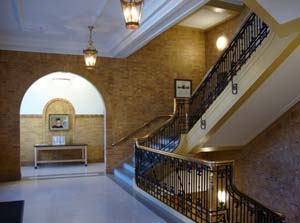 |
 |
| current issue |  | past issues |  | send a letter/news |  | address update |  | advertise |  | about us |  | alumni home |
Web Extras
The Life and Work of Charles JamesPage: < Prev 1 2 3 4 5 Next >
Parsons in 1893 was more than a chemist. His great talent was that of an organizer. He had designed the classroom and labs when Conant was built. The building became James' professional home for the rest of his life. In fact, in 1999, the American Chemical Society named Conant as a National Historic Chemical Landmark, the first such award in New England, and the 23rd such building in the country. Parsons, seeing in the early 1900s the importance of the field of chemistry, was in the process of founding a national organization—the American Chemical Society—in Durham. For a time the national society had its headquarters in Conant Hall. Parsons continued to hold a long tenure as the National Executive Secretary. In addition, Parsons and James were the founding members of another national organization, a chemical fraternity: Alpha Chi Sigma.
Parsons was made head of the department, but left Durham in 1911 to become chief mineral chemist of the U.S. Bureau of Mines. He asked James to come with him, but without success. In 1911, James himself became full professor and the head of the department. The two men were very different, but James was fortunate to have worked with Parsons, who was a remarkable man.
Life in Durham
For his first nine years in Durham, James was a bachelor and lived in a rented bay-windowed house on Main Street that he shared with three other single instructors. They called their house the Faculty Club ³. Besides his classes, James spent six nights a week from 6 p.m. to midnight on his research. At midnight he served tea to any one who might be there. He found time to play bridge, spent time in the official Faculty Club, and become a 32 degree Freemason. He also took up other interests: collected stamps, and visited central America to collect orchids and study butterflies.
In 1915, at 35, he married Marion Templeton, built a house and became an ardent gardener. He specialized in delphinium propagation and was well known for the beauty of his garden. He had 14 hives of bees, the social life of which fascinated him. He became a well known expert in this field.
 Inside James Hall |
During this time, he got to know the local residents and the college community. Everyone appreciated his fine mind; he was outstanding in the original nature of his thought. Sir William Ramsey wrote, "James is certainly able to take his place with any of the [American chemists], allowing for his age, in originality and power for work. He was always original ever since he came as a youngster to my laboratory." 4 The word "original" appears many times in references to him.
He was romantic. He loved the mysterious, the unknown and the rare. Thus he pursued the rare earths. He was interested in strange lands. He talked of going to Egypt, Australia and Tonga. He read travel books, particularly books on and by Laurence of Arabia. All of this affected his work and accomplishments, or perhaps one should say that his accomplishments were the result of his romanticism and intellect combined. He was very hard-working and self disciplined, and was a perfectionist.
On a casual level, people who knew him said he was always courteous and charming and possessed a great sense of humor. He was thoroughly likable. He was also extremely kind, and helpful to students and people in general. He would put aside his own work to help someone else.
He was also retiring, shy and very modest. If he ever spoke of his work, it was as if he were mowing the lawn. This modesty was in some ways a detriment, concealing his abilities and limiting his reputation. For example, although he participated in the Northeastern Section of the American Chemical Society, he never went to national meetings to give important papers or to meet other nationally distinguished chemists. What was exciting to him was a problem, no matter how simple; the process of research; and a correct solution.
Page: < Prev 1 2 3 4 5 Next >Easy to print version

